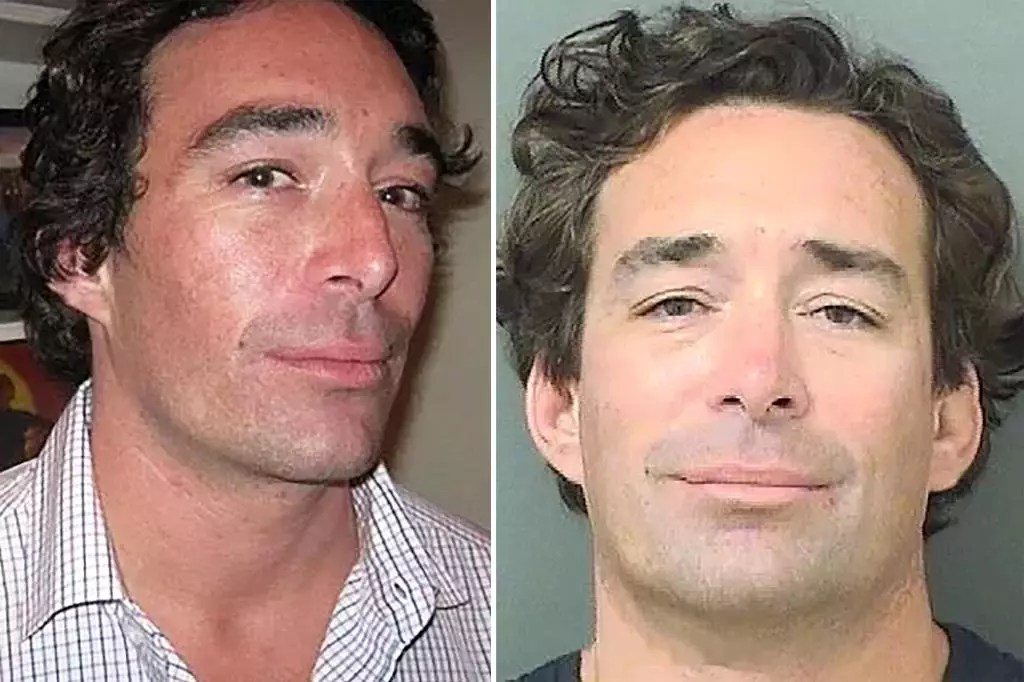In a recent whirlwind of legal troubles, Alexander “Nico” Fanjul, a scion of the powerful sugar dynasty, pleaded guilty to various charges, including criminal battery, stemming from a domestic violence incident at his Palm Beach residence. As part of a plea deal, Fanjul was sentenced to four years of probation and mandated to complete 200 hours of community service. This shocking event has drawn attention not only to Fanjul’s actions but also to the broader implications of privilege and accountability among the affluent.
The specifics of the incident, which occurred earlier this year, underscore the alarming reality behind the doors of wealth. Initial reports revealed that police were summoned to his home after neighbors reported hearing a woman screaming. Upon arrival, officers found Fanjul seemingly in a position of dominance over a woman who was in distress, and whose injuries were glaringly evident. The scene painted a troubling picture, raising questions about the dynamics of their relationship and the kind of environment Fanjul cultivated at his residence.
Before the domestic violence episode, Fanjul was observed dining at a prestigious restaurant, Flagler Steakhouse, located in the luxurious Breakers Hotel. Accounts suggest that his temper had flared unexpectedly during dinner due to discomfort over the couple sitting near them—an incident that reportedly culminated in a violent outburst. However, representatives from the restaurant indicated that they did not notice any sign of distress or disruption, which adds layers of complexity to the narrative. This discrepancy draws attention to the often unseen realities of abusive relationships, where witnessing an incident may not simply hinge on loud fights or overt disputes.
Fanjul’s self-portrayal through his public relations team emphasizes a desire for self-improvement and community service, but such statements beg the question of genuine accountability. When individuals come from substantial wealth, there is often a supportive network that reframes their narratives, shielding them from the repercussions that others may face. This layer complicates the public’s perception of justice and the societal ramifications for individuals caught in cycles of domestic violence.
The domestic violence incident is not an isolated occurrence in Fanjul’s life; there are previous allegations that paint a more troubling pattern. In a separate incident in April 2023, his former girlfriend accused him of physically tackling her when she attempted to retrieve her belongings. This claim further complicates the image of a privileged heir seeking to better himself and reflect positively on his community. The historical context of recurring allegations, including past accusations from a high-profile socialite, Tinsley Mortimer, raises alarms about the trend of unreported violence, as well as the systemic failures that often allow such behavior to persist unchecked.
Fanjul’s history with Mortimer is particularly alarming, with resurfacing claims of physical altercations that reportedly resulted in injuries. Such incidents call into question the safeguards that luxury and privilege provide, as individuals with substantial power often navigate the justice system differently than those without it. The pattern of alleged violence reveals an alarming continuity, suggesting that despite the façade of reform, the underlying issues may not have been addressed adequately.
Fanjul’s case represents a microcosm of broader societal issues regarding wealth, privilege, and the complexities of accountability. The narrative of wealthy individuals facing minimal consequences for severe actions disrupts the perception of equality under the law. As a society, discussions surrounding domestic violence often fail to address how socioeconomic status shapes outcomes. The trending notion that financial resources can insulate individuals from the full extent of justice reveals significant flaws in the systems intended to protect victims.
As Nico Fanjul embarks on his mandated rehabilitation program, the question looms large about whether this path toward self-improvement is genuine or merely a reflection of privilege designed to restore his public image. The community’s response to domestic violence is vital; awareness and proactive measures must outpace the whispers of scandal in the halls of wealth. Transparency, advocacy, and justice must take precedence over anonymity and avoidance, creating an environment where accountability resonates more deeply than monetary means.
Alexander “Nico” Fanjul’s legal troubles and the allegations surrounding him illuminate serious societal issues. The path forward demands crucial dialogues about accountability, responsibility, and the need for systemic change to address domestic violence across all spectrums of society, particularly where privilege may blur the lines of justice.







Leave a Reply